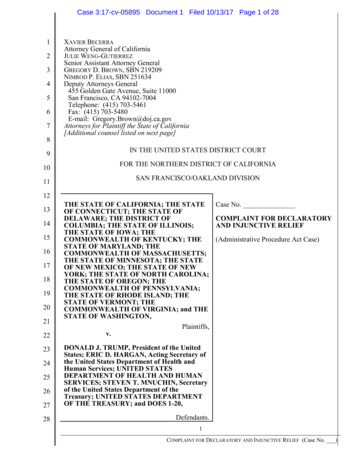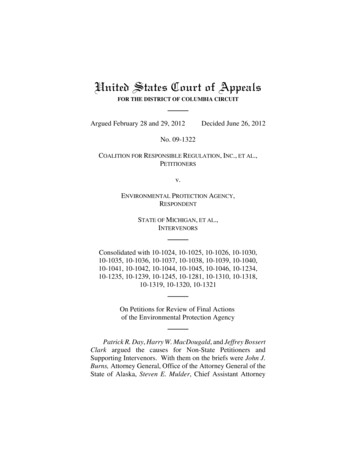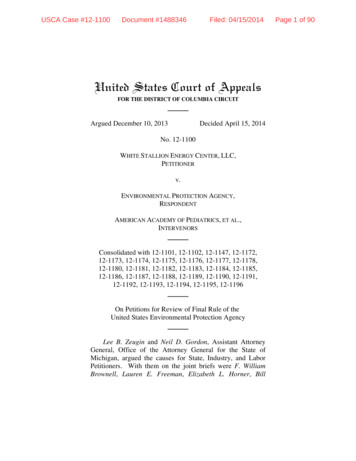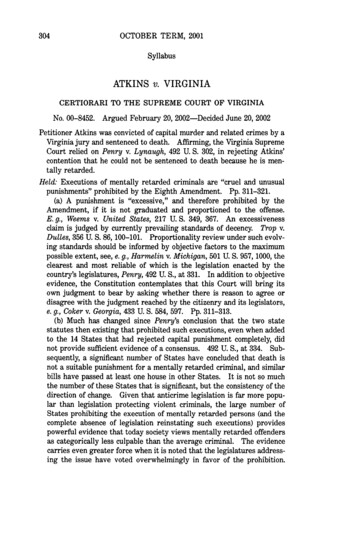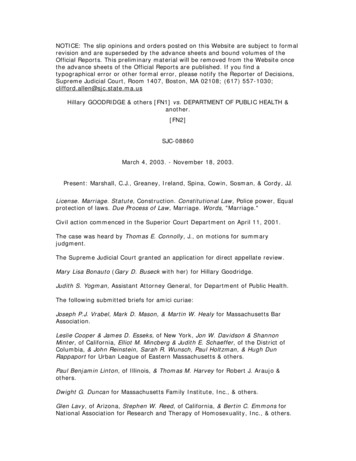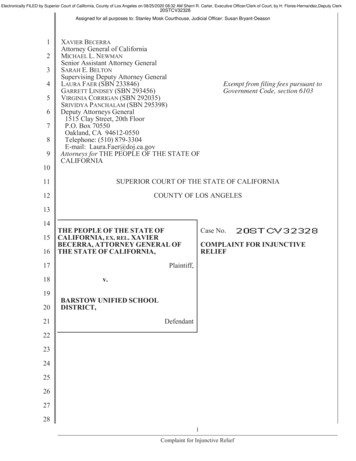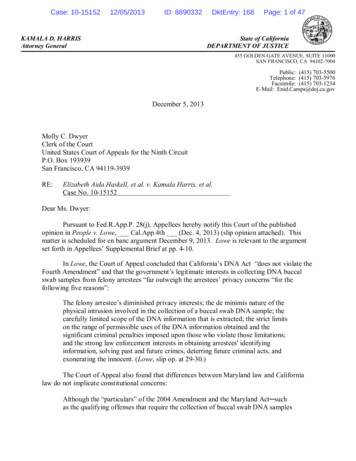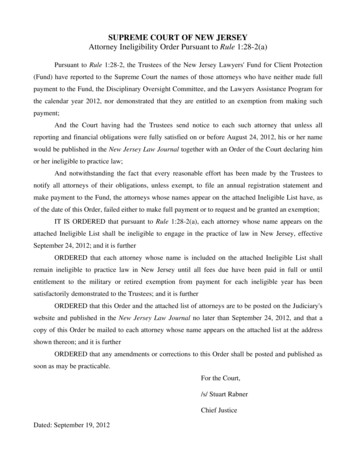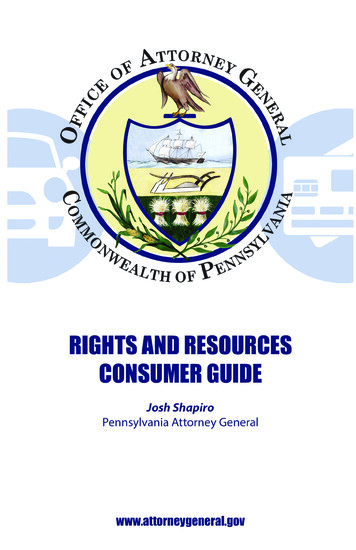
Transcription
Dear Fellow Pennsylvanian,Whenever you spend your hard-earnedmoney, you deserve a fair deal, but somepeople think they can make a quick buckby scamming you- taking your money andnot giving you what they promised. Asyour Attorney General, I am committedto protecting all Pennsylvanians fromconsumer fraud and illegal businesspractices. There is no shortage of scammers seeking to take advantagehonest consumers, and I’m ready to take on each and every one of them foryou.Any of us can fall victim to a scammer, whether it be online, in person, oreven someone we know and trust. The best way fight scammers is to avoidbecoming a victim of consumer fraud in the first place. To help do this,you’ll need to know your rights and responsibilities as a consumer. Thisbooklet is designed to provide you with important information on consumerrelated topics, including tips for spotting a variety of deceptive practices;examples of fraudulent activities; and helpful tips for protecting yourself.As Attorney General, my job is to protect all Pennsylvanians from fraudand scams. Our staff is ready to help you, no matter how large or small theproblem. If you have any questions on a consumer-related matter or wouldlike to file a complaint, please contact my office’s Bureau of ConsumerProtection using any of the following methods: Call toll-free at 1-800-441-2555 Email us at scam@attorneygeneral.gov Visit our website at www.attorneygeneral.gov and sign up foralertsJosh ShapiroAttorney General
Table of Contents5The Bureau of Consumer Protection and your Complaint7Automobiles12Charitable Giving14Credit Rights & Identity Theft19Debt Collection21Deceptive Sales Practices & Contracts for Goods and Services24Health-Related Issues30House-Related Issues42Memberships46Product Safety and Recalls48Scams - Detecting and Avoiding62What are Card Skimmers?63Telemarketing67Warranties & Guarantees69Office of Attorney General Contacts70Report a Scam71Directory of Consumer Resources
The Bureau of Consumer Protection and your ComplaintThe Bureau: Mediates consumer complaints Investigates unfair or deceptive business practices Takes legal action against companies to protect the publicinterest in a fair marketplace Cooperates with local, State and Federal law enforcementagencies on consumer protection initiatives Participates in consumer protectioneducation programs and distributeseducational materials Advises on legislation which may affectconsumer interestsSteps to effectively resolve a complaintyourselfBefore you file a complaint with the Bureauof Consumer Protection, here are some tipsthat may help you resolve your own problem: Determine the specific complaint youwish to make, and do so without delay. Determine the specific action you want the business totake to remedy your complaint. If you are making the complaint in person, take alongthe purchase receipt, any guarantee or warranty and, ifpossible, the product. Be assertive! If a salesperson or company representativecannot deal with your complaint, ask for a higherauthority or supervisor. When you complain by mail, give the brand name,model number, size, color and other details needed foridentifying the product. Include in your letter a specificexplanation of the circumstances surrounding yourcomplaint. Keep a copy of your letter and all correspondence youreceive. If you return the product, be sure to insure it.5
Filing a complaint with the Bureau: The Bureau will attempt to mediate complaints that fallwithin its jurisdiction, by trying to engage the business inour voluntary mediation process. The mediation process generally take a minimum of threemonths and may take longer, depending upon the issuesinvolved, the amount of time it takes to gather all thefacts, and the willingness of the parties to cooperate in theprocess. If the business refuses to engage in mediation, you mayhave to exercise your individual rights, because the Bureaucannot, by statute, provide private legal representation forindividual consumers. If your issues fall outside the Bureau’s jurisdiction (forinstance, the transaction occurred in another State), wewill try to refer you to an agency that has the ability toassist you.Consumer Protection Helpline1.800.441.2555www.attorneygeneral.gov6
AutomobilesAlthough just about everybody buys an automobile at somepoint in time, many people are wary of having to purchasea car. Fortunately, Pennsylvania has Automotive IndustryTrade Practices Regulations, which provide consumers withmany protections when buying a car. These regulations covernumerous aspects of the car-buying process, from advertising tothe condition of the vehicle.Advertising and RepresentationsOne section of the regulations prohibits deceptive advertisingand misrepresentation in describing a carand its price. Also, dealers must disclosecertain defects or conditions. Advertisementsmust include: The business name and address of thecar dealer. The year, make and model of the car. The conditions of sale, includingthe offer’s expiration date and anylimitations on the number of vehiclesavailable. If the price is indicated, it must includeall charges usual or necessary prior to delivery, suchas freight, handling and dealer preparation charges, (tax,registration and licensing costs need not be included). Any known defects existing in the frame, block,transmission, or differential; flood damage or inability topass state inspection.In addition, the regulations also contain detailed provisionsabout the written agreement given to you when you buy a car.Among these, the regulations require that: A copy of the written contract or agreement of sale, theinstallment sales contract, an odometer statement and thewarranty be provided to the consumer.7
The contract must list the car as “new” or “used,” and, if“used,” must describe the vehicle’s prior usage. The contract must list itemized charges for any item notincluded in the purchase price. The dealer must deliver the car within the time specifiedin the contract or within eight weeks after the contractdate. The dealer must honor the quoted trade-in allowance. An “As-is” notice must be in a car being sold withoutwarranty.The Internet provides many helpful tools to consumers who arepricing an automobile. Many services will list every new andused car price including the Manufacturer’s Suggested RetailPrice (MSRP), invoice price, price of options and freight. Bothretail and wholesale prices are listed for used automobileswhich take into consideration condition, mileage, and options.Armed with this information, an educated consumer is lesslikely to become the target of a deceptive sales presentation.Lemon Law ProtectionsThe Pennsylvania Automobile Lemon Law applies to any newvehicle purchased and registered in Pennsylvania for personalor family use and designed to transport up to 15 persons.Motorcycles, motor-homes and off-road vehicles are notincluded. Under the law, the manufacturer must, at no cost tothe purchaser, repair or correct any defect which substantiallyimpairs the use, value or safety of the vehicle and which occurswithin one year after delivery, or 12,000 miles of use, or theterms of the manufacturer’s express warranty, whichever comesfirst.If the defect cannot be repaired after three (3) attempts, or if thevehicle is out of service for a total of 30 calendar days for repair,generally, you may be eligible for a replacement vehicle or therefund of the purchase price, less a limited allowance for use.First, contact the manufacturer’s zone representative at the8
telephone number listed in your owner’s manual. If the zonerepresentative is not successful in having the defect corrected,you may request an arbitration of your case through themanufacturer’s dispute settlement program if one exists. Thearbitration decision is binding on the manufacturer, but not onthe consumer, who may proceed further by bringing a privatelawsuit.If the manufacturer has not established an appropriate disputeresolution procedure, you may initiate a legal action at theoutset. Some important requirements of the law are: You are responsible for deliveringthe vehicle to the manufacturer’sauthorized repair facility unless itwould be unreasonably difficult todo so. In that case, you must givewritten notice to the manufacturerso that arrangements can be madefor transporting the vehicle, at noexpense to you, to a repair site. Each time your vehicle is repaired, therepair facility must give you a detailedstatement, itemizing all repairs made,and the cost of parts and labor. Your rights under the law will not apply if the defect is theresult of your abuse, neglect or alteration of the vehicle.If a vehicle has been returned to the manufacturer for defects,it may not be resold in Pennsylvania unless the manufacturerprovides the consumer with: A written statement that the vehicle was returned becauseof a defect which was not cured within a reasonable time,and The same express warranty provided originally, exceptthat it may last only for 12,000 miles or 12 months afterthe resale date.9
Vehicles with defective braking or steering systems, likely tocause death or serious bodily injury if driven, may not be resoldin Pennsylvania.Almost everybody faces the problem of repairing an automobile.No matter what kind of car you drive, at some time or otheryou will either need to get it fixed, or at least have routinemaintenance performed to keep it running.Unfortunately, auto repair problems are among the mostfrequent sources of consumer complaints. It is important toknow your rights before you go to a repair shop so you can avoidtrouble.Choosing the right shopThere are many auto repair facilities from which you can choosewhen you need repairs. Some shops are small, independentbusinesses. Others are part of large national chains. Some willdo almost any type of repair, while others specialize in the kindof work they do. Most are good and the people who run themare honest. In deciding where to take your car, there are a fewthings you should consider: Learn about good shops before you need one, so youwon’t have to choose a shop at the last minute. Get recommendations from family and friends aboutgood experiences they have had with repair shops ormechanics. Make sure the shop you choose is capable of performingthe type of repair you need. If you have a warranty that covers the repair, make certainthe shop will honor it, and is authorized to make the repairunder the warranty. Comparison shop for prices: there can be large differencesin charges among repair facilities.10
Pennsylvania’s Auto RegsPennsylvanians are protected by the Automotive Industry TradePractices Regulations, which detail consumers’ rights whenhaving a car repaired. The regulations provide that a repairshop must: Obtain the consumer’s written or verbal authorizationbefore charging for repairs. Obtain additional authorization from the consumer beforeperforming repairs which exceed the dollar limit set by theconsumer. Inform the consumer whether partsput on the vehicle are new, used orreconditioned. Disclose, in advance, any charges forestimates or storage. Complete repairs within the timespecified (or within 24 hours ofdelivery if no time is mentioned). Advise consumers of their rights tohave replaced parts returned to them. Provide a detailed bill itemizing chargesfor parts and labor.Consumer Protection Helpline1.800.441.2555www.attorneygeneral.gov11
Charitable GivingLegitimate charities need your help. Before giving, however, youshould make sure that a charity deserves your contribution byfollowing these tips for informed giving:Know your charityDo not be tricked by an impressive-sounding name or one thatis similar to a well-known charity. Too many “charities” try totake advantage of another charity’s good name and reputationby using an almost identical name, symbol or logo.Know how your money will be spentBefore donating, ask for and read printed materials about thecharity’s finances and programs. Find out how much of yourdonation actually goes to helping people and program services,as opposed to fund-raising and administrative expenses. Allcharities should have a printed annual report that includes thisinformation, and should provide you with a copy if you ask.You may also obtain this information by calling Pennsylvania’sBureau of Charitable Organizations, toll-free, at 1-800-732-0999,or by writing: Bureau of Charitable Organizations, Departmentof State, 207 N. Office Building, Harrisburg, PA 17120.Know your charity’s goalsMake sure you agree with the purpose of the charity. You maywish to support a research-oriented charity, as opposed toa “patient service” charity, or one that only provides publiceducation. Give to a charity that bests fits your goals.Telephone solicitorsBecause telephone solicitations are typically conducted bypaid professional fund-raisers on behalf of the charity, ask thecaller if he/she is paid or a volunteer and how much the charityreceives of each dollar donated. For example, if tickets to abenefit show are being sold with the promise of underprivilegedchildren attending for free, ask how many children will attendthe event, how they are chosen, whether free transportation willbe provided, and if an accompanying adult is also admitted forfree.12
Door-to-door solicitorsDemand identification! Do not feel pressured by the person atyour door. The best practice is to mail your donation directly tothe charity.Do not be pressured into givingTake time to think about your donation. High-pressure tacticsand sob stories often are the signs of unscrupulous operators.Unordered merchandiseYou have no obligation to pay for greeting cards, tickets,advertising, merchandise or any other item you neverasked for, nor are you obligated to return them.What to do before givingMake sure the charity has compliedwith Pennsylvania’s registration law byregistering with the Bureau of CharitableOrganizations, Department of State, asmost charities are required to do. TheBureau can be contacted, toll-free, at 1-800732-0999.Additional information may be obtained bycontacting the Better Business Bureau, whichmonitors and reports on charities: 1880 JFK Blvd, #1330, Philadelphia, PA 19103(215) 893-9235 400 Holiday Drive, Suite 220, Pittsburgh, PA 15220 The Better Business Bureau, Wise Giving Alliance3033 Wilson Blvd., Suite 600, Arlington, VA 22203(703) 276-0100Method of payment - If you decide to contribute, pay by check.Make the check out to the charity, not to a company or theindividual collecting the donations, and send directly to thecharity. Never pay cash or use your credit card number inresponse to a request by a stranger.13
Credit Rights & Identity TheftThe Fair Credit Reporting ActThe three major credit reporting agencies, TransUnion,Experian and Equifax, maintain a credit history on you whichis available to creditors. According to the Federal Fair CreditReporting Act: You are entitled to receive one free copy of your creditreport from each of the three nationwide credit reportingagencies every twelve months. You can request your free credit report online at www.annualcreditreport.com or by calling 1-877 -322-8228. You are also entitled to receive a free copy of your creditreport under certain circumstances, including if you weredenied credit, employment or insurance within the last 60days, you are the victim of identity theft, you are on publicassistance, or you are unemployed and expect to applyfor employment within 60 days. Your credit report can beshown to those who need such information for extendingcredit or insurance or reviewing employment applications. Most information in your file can only be reported forseven (7) years. However, bankruptcies can be reportedfor 10 years. If you inform the credit bureau of inaccurateinformation in your file, the information must beinvestigated, errors must be corrected and creditors whoreceived the incorrect information must be advised of thechanges. If there is a dispute about information in your file whichcannot be resolved, you may require the credit bureauto note that the information is disputed in future creditreports.14
Truth in Lending ActAnother federal law, the Truth in Lending Act, provides theserights: Periodic statements must be mailed to consumers usingcredit cards and revolving charge accounts in sufficienttime to avoid finance charges by prompt payment. The issuance of unsolicited credit cards is prohibited. Cardholder liability for lost or stolen credit cards is thelesser of 50 or the amount charged prior to notificationof the loss. Creditors must disclose to you the totalfinance charge, including all charges suchas placement fees and insurance, theannual percentage rate of interest andthe amount of each monthly paymentand the number of payments required. If a creditor requires you to obtain“credit insurance” to guarantee that adebt will be paid should you die, getsick or become disabled or to coverdamage to property which is collateralfor the debt, the premium charged mustbe included when computing the annualpercentage rate. If you voluntarily agree to obtain “credit insurance” orif you choose to obtain it from an outside insurancecompany, then the premium charged need not beincluded in the annual percentage rate.The Equal Credit Opportunity ActThe Equal Credit Opportunity Act prohibits discrimination in acredit transaction. It does not, however, guarantee that you willget credit. According to the Act: Discrimination because of sex, marital status, race,national origin, religion or age is prohibited. Except for voluntary information needed to enforce theabove anti-discrimination laws, a creditor cannot ask yourrace, sex, national origin or religion.15
A creditor cannot ask whether you are divorced orwidowed or about your plans for having children. A credit application must be accepted or denied within30 days. If denied, the creditor must inform you in writingof either the specific reason for the denial or your right torequest that reason within 60 days. Where both spouses use or are liable on an account,credit information must be supplied in the names of bothspouses.Pennsylvania Goods and Services Installment Sales ActThis law regulates credit transactions involving goods andservices bought for personal, family or household purposes.Under the Act: The seller or holder of a credit agreement cannot take amortgage against your residential real estate or that of aco-signer. Before a seller can attempt to repossess goods or startlegal action to collect the debt, he must give you one lastchance, by way of a 21 – day notice, to pay all amounts indefault. Wage attachments are generally prohibited.Once you obtain credit privileges, know your responsibilities inrepaying your indebtedness: The amount of the finance charges you may be assessedwill vary depending on the type of purchase, the type oflender and the location of the lender. Late fees and collection charges may also be assessed. Since a lender earns more interest at the beginning of aloan than near the end, payments which you make at thebeginning of a loan do very little to reduce the principal.If you have encountered a problem with incorrect informationin your credit report, in obtaining credit or in exercising yourcredit rights, contact the Bureau of Consumer Protection.16
Identity TheftIt is fastest growing white collar crime in the United States.Over ten million Americans fall victim to this crime every yearfrom ordinary citizens to celebrities, young and old, and from allsocioeconomic backgrounds.Identity thieves can operate boldly by picking your pocket orrummaging through your trash and your mailbox. And, they canoperate invisibly, through breaching online security systems,on your own computer or on commercial or other computersystems. Other times, they openly lure you under false pretensesinto providing your social security number, financialaccount numbers, passwords, PIN numbers andother personal information. But regardlessof how they acquire the information, thethieves may quickly apply for loans or creditcards, lease cars, make purchases, defraudutility companies or rent apartments usingyour identity; or, they may hold onto yourinformation for a matter of years and thenbegin to use it, after you have been lulledback into a sense of security. Some helpfulhints to prevent identity theft: Promptly remove mail from your mailbox anddeposit mail in US Post Office receptacles. Empty your purse/wallet of extra credit cards or ID cards,including your Social Security card. Memorize your PIN numbers. Never give out personal information over the phone. Stop credit card companies from sending pre-approvedapplications to your home by calling 1-888-5-OPT-OUT(1-888-567-8688). Be certain you receive and review monthly financialstatements and bills. Make inquiries about unexpected bills, unauthorizedcharges on utility and telephone bills, credit card chargesor bank account debits.17
Shred credit card receipts, bills and other financialinformation, as well as magazine subscription labels. Regularly review your credit report from all three creditreporting bureaus. You are entitled to one free reportannually from each bureau, which can be obtained at www.annualcreditreport.com or by calling 1-877-322- 8228. There are many other companies which, for afee, will provide round-the-clock monitoring servicesfor all three credit reports and issue alerts at anyactivity. Although these monitoring services cannotprevent identity theft, they may help identify rogue orunauthorized activity swiftly and enable consumers toaddress the problem quickly. Remember, nobody is more effective at preventing andprotecting against fraud than the individual.If you are the victim of identity theft, file a report with localpolice, close bank and credit card accounts and contact thecredit reporting bureaus to freeze or place a fraud alert on yourcredit report. To file a complaint, call the Office of AttorneyGeneral, Bureau of Consumer Protection Toll-Free Helpline at1-800-441-2555 or visit www.attorneygeneral.gov.Consumer Protection Helpline1.800.441.2555www.attorneygeneral.gov18
Debt CollectionThe Fair Credit Extension Uniformity Act regulates thedebt collection activities of debt collectors and creditors inPennsylvania. This law, effective as of June 26, 2000, prohibitsdebt collectors and creditors from engaging in certain unfair ordeceptive acts or practices while attempting to collect debts.Communications with debtorsUnless they have your prior consent or the express permissionof a court, debt collectors and creditors may not communicatewith you: At unusual times and places. Before 8 a.m. or after 9 p.m. At work if they know your employerdisapproves of such contacts; or When they know you are representedby an attorney.If you are contacted by a debt collector, askthat they send you written validation of thedebt.Communications with third partiesDebt collectors and creditors may communicatewith third parties only for the purpose of acquiring locationinformation about you. During these third party contacts, debtcollectors and creditors may not reveal that you owe any debt.HarassmentDebt collectors and creditors may not harass, oppress or abuseyou or any third parties while collecting a debt. Examples of thisinclude: Threatening you with violence or harm; Publishing a list of consumers who refuse to pay theirdebts (except to a credit bureau); Using obscene or profane language; or Repeatedly using the telephone to annoy.19
False statementsDebt collectors and creditors may not use any false ormisleading statements when collecting a debt. Examples of thisinclude: Falsely implying that they are vouched for, bonded oraffiliated with the government; Falsely implying that they are attorneys; Falsely implying that you have committed a crime or willbe charged with a crime for non-payment; Falsely implying that documents sent to you are legaldocuments, when they are not; Falsely implying that documents sent to you are not legaldocuments, when they are; Misrepresenting the amount or legal status of your debt;misrepresenting their name; or Threatening to file a lawsuit when they cannot, forinstance, when the debt is time-barred, or do not intendto do so.Unfair or Unconscionable PracticesDebt collectors and creditors may not use unfair orunconscionable means to collect a debt. Examples of thisinclude: Collecting any amount greater than your debt, unlesspermitted by the agreement creating the debt or by law; Depositing a postdated check prematurely; Using deception to make you accept collect calls or payfor telegrams; Contacting you by postcard.20
Deceptive Sales Practices & Contracts for Goods andServicesWhile most businesses are run legitimately, be on the lookoutfor the unscrupulous merchant. Beware of the following salespractices.Bait & SwitchBy law, stores are not allowed to advertise with the intentof pressuring or improperly luring customers into buying adifferent or more expensive product. Bait and switch involvesfirst “baiting” a consumer with an advertisement for anappealing, inexpensive item. When the consumer visitsthe store, however, and asks to see the advertisedmerchandise, the salesperson discourages itspurchase and attempts to sell a higher pricedproduct, which is the “switch.” Sometimesthe “switch” may be to a product that is thesame price, but the store benefits becauseof a higher markup on the item.Going-Out-of-Business SaleSome stores will advertise that they aregoing out of business when they really haveno such intention and, in fact, are constantlybringing in new merchandise.State laws regulate going-out-of business sales by requiringthe business to obtain a license from the local municipality.No goods may be added to the store’s inventory after theapplication is made.Going-out-of business sales can be conducted for no more than30 days. If all goods have not been disposed of during thattime, a business may get one 30-day extension. Before makinga purchase, remember that, if a store goes out of business, itswarranties may no longer be valid (although the manufacturer’swarranty will still be valid), nor will the merchandise bereturnable.21
The Continuous SaleA store engaged in a continuous sale will constantly claim thatall, or a substantial portion of, its merchandise is ON SALE.Some stores put sale tags on merchandise and claim that theitem has been specially reduced when the price marked is reallythe normal everyday selling price.Protect yourself by shopping around. Go to several storesand compare the prices of the same product. Don’t base yourdecision on what to buy solely on price. Investigate the store’swarranty, return and delivery policies.If you believe you have been a victim of a deceptive salespractice, contact the Bureau of Consumer Protection.No Right of CancellationThere is no automatic right-to-cancellation of the contractssigned away from your home, such as for the purchase of anautomobile, so carefully weigh those purchase decisions beforesigning.Rent-to-Own TransactionsSometimes, as an alternative to buying merchandise such asfurniture, large appliances, televisions, computers and othersuch items, people may rent these typically high-cost itemsthrough a rent-to-own transaction. In a rent-to-own transaction,the person will rent the merchandise and, at a certain point, theperson can obtain ownership of the item.A rent-to-own transaction can have some benefits. People whodo not have enough cash to simply purchase high-cost itemsthat they need or want, and who may have difficulty gettingtraditional credit (that is store accounts, credit cards, etc.),often attempt to purchase through the rent-to-own method. Bymaking weekly or monthly payments, the person can get theimmediate use of the item and merchandise, which is often new.Service is usually provided by the rental company at noadditional charge, so there may be no repair costs during therental period.22
A rent-to-own transaction also has drawbacks. The finalpurchase price of an item bought through rent-to-own is usuallymuch higher than the price of the same item bought at a retailstore, even if the item is financed over time at the retail store.Rent-to-own costs can be twice as high as the straight purchasecosts, and are sometimes three to four times as much! Manypeople who are considering rent-to-own would be financiallybetter off by either saving money to buy the item, or buying agood used item rather than getting the new item through a rentto-own transaction.Rent-to-own transactions are governed byPennsylvania’s Rental Purchase Agreement Act,which has specific requirements about thetypes of written information that a consumermust be given. The law requires that therental company provide, in writing: thetype of fees and late charges which canbe imposed; the total dollar amount whichmust be paid for an item to get ownershipthrough the rent-to-own method; and theway for the consumer to get ownership of theitem earlier (and cheaper) than stated in theoriginal agreement.If a rent-to-own company violates the Rental PurchaseAgreement Act, the Bureau of Consumer Protection can help.23
Health-Related IssuesBuying a Hearing AidThe Hearing Aid Sales Registration Law provides consumerspurchasing a hearing aid in Pennsylvania with various rightsand protections.All hearing aid dealers and fitters must be registered withthe Pennsylvania Department of Health and the registrationcertificate must be conspicuously posted in their office or placeof business.During the initial contact, hearing aid dealers and fitters mustadvise you that any fitting, examination or representationmade by them regarding the hearing aid is not an examination,diagnosis or prescription by a person licensed to practicemedicine and, therefore, must not be regarded as a
Trade Practices Regulations, which provide consumers with many protections when buying a car. These regulations cover numerous aspects of the car-buying process, from advertising to the condition of the vehicle. Advertising and Representations One section of the regulations prohibits deceptive advertising and misrepresentation in describing a car
